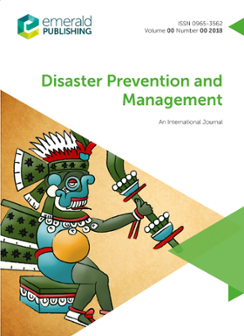Disaster Prevention and Management: Volume 29 Issue 6
Strapline:
An International JournalTable of contents - Special Issue: Disrupting the status quo: Reconstruction, recovery and resisting disaster risk creation
Guest Editors: Jason von Meding, Ksenia Chmutina, Giuseppe Forino, Emmanuel Raju
Assessing disaster capitalism in post-disaster processes in Chile: neoliberal reforms and the role of the corporate class
Vicente Sandoval, Claudia Gonzalez-Muzzio, Carlos Villalobos, Juan Pablo Sarmiento, Gabriela HobermanThis paper examines disaster capitalism in Chile, that is, the relationships between disasters and neoliberalism. It looks at two post-disaster dimensions: disasters as windows of…
Knowledge adoption in post-disaster housing self-recovery
Eefje Hendriks, Aaron OpdykeThe purpose of this study is to explore communication of hazard-resistant construction techniques after disaster in the absence of outside influence. It further aims to unpack the…
Social environmental injustices against indigenous peoples: the Belo Monte dam
Heidi Michalski Ribeiro, Jose Rubens MoratoThis proposal is a case study of the Belo Monte dam. The article deals with human rights and environmental violations arising from the construction of the Belo Monte Hydroelectric…
Relocalisation for degrowth and disaster risk reduction
Oluwadunsin Moromoke Ajulo, Jason von Meding, Patrick TangVulnerability is understood as susceptibility to hazards born out of the complex interaction within the system scales. The current global economic system focuses on persistent…
The paradox of community involvement: rebuilding Minamisanriku
Wesley CheekThe purpose of this paper is to identify the barriers to community participation in post-disaster reconstruction in Minamisanriku, Japan.
We said, they said: the politics of conceptual frameworks in disasters and climate change in Colombia and Latin America
Gonzalo Lizarralde, Holmes Páez, Adriana Lopez, Oswaldo Lopez, Lisa Bornstein, Kevin Gould, Benjamin Herazo, Lissette MuñozFew people living in informal settlements in the Global South spontaneously claim that they are “resilient” or “adapting” to disaster risk or climate change. Surely, they often…
(In)Visibilization through decolonial delinking? Disrupting the permanently neglected disaster at the border of Colombia and Ecuador
Johannes M. WaldmuellerThe geopolitical relevance of the region with regard to clandestine and market interests exerting ecological pressures over mangroves and artisanal fishing thus raises awareness…
Fit for purpose? Lessons from transitional shelter provision for internally displaced persons in urban informal settlements in Brazil
Mirian Sayuri Vaccari, David Sanderson, Martin Loosemore, Mohammad MojtahediThe purpose of this paper is to explore the challenges of transitional shelter provision for internally displaced persons (IDPs) in urban informal settlements. While there has…
Preliminary research on sponge city concept for urban flood reduction: a case study on ten sponge city pilot projects in Shanghai, China
Shuxian Feng, Toshiya YamamotoThis research aimed to determine the differences and similarities in each pilot project to understand the primary design forms and concepts of sponge city concept (SCC) projects…

ISSN:
0965-3562Online date, start – end:
1992Copyright Holder:
Emerald Publishing LimitedOpen Access:
hybridEditors:
- Dr JC Gaillard
- Dr Emmanuel Raju